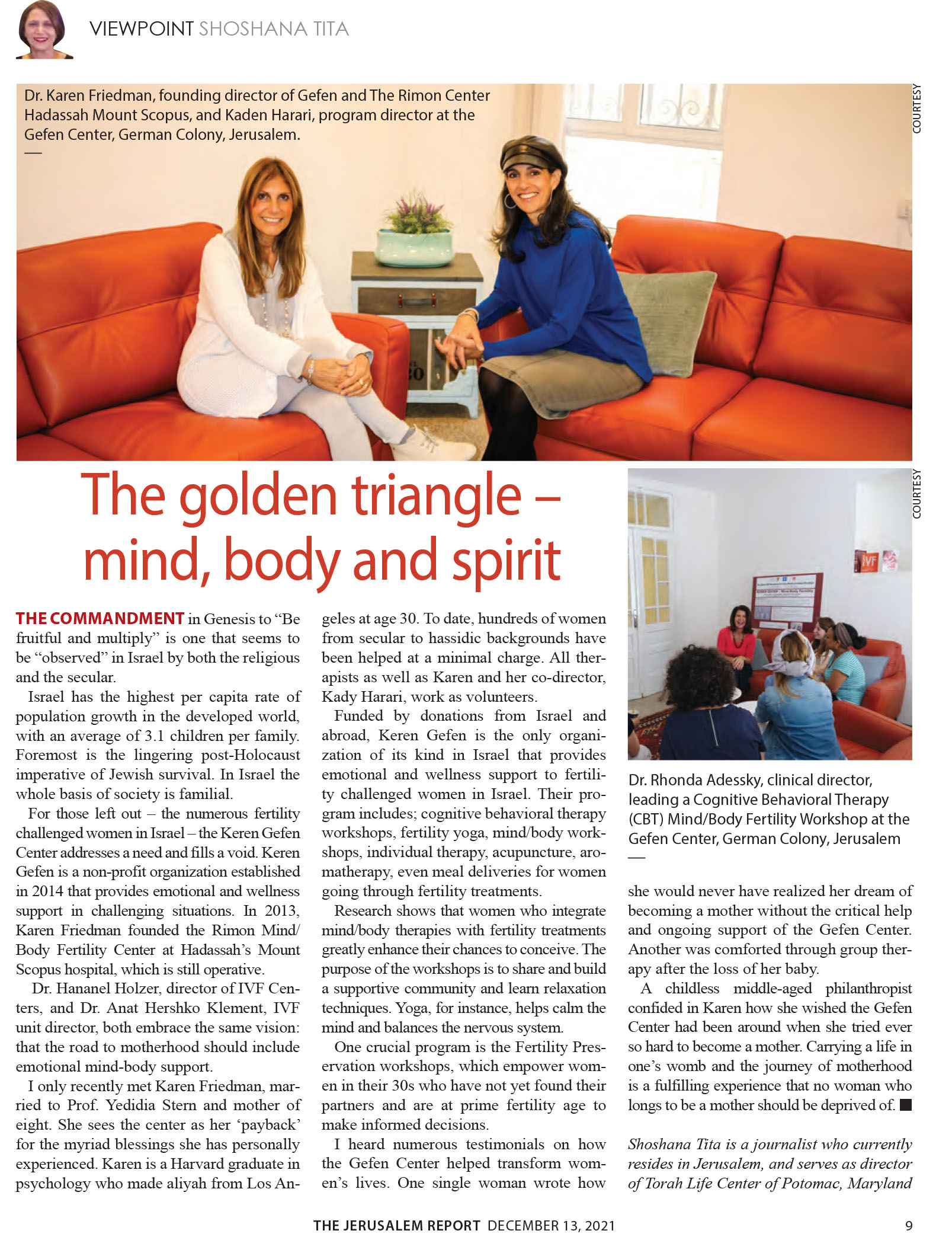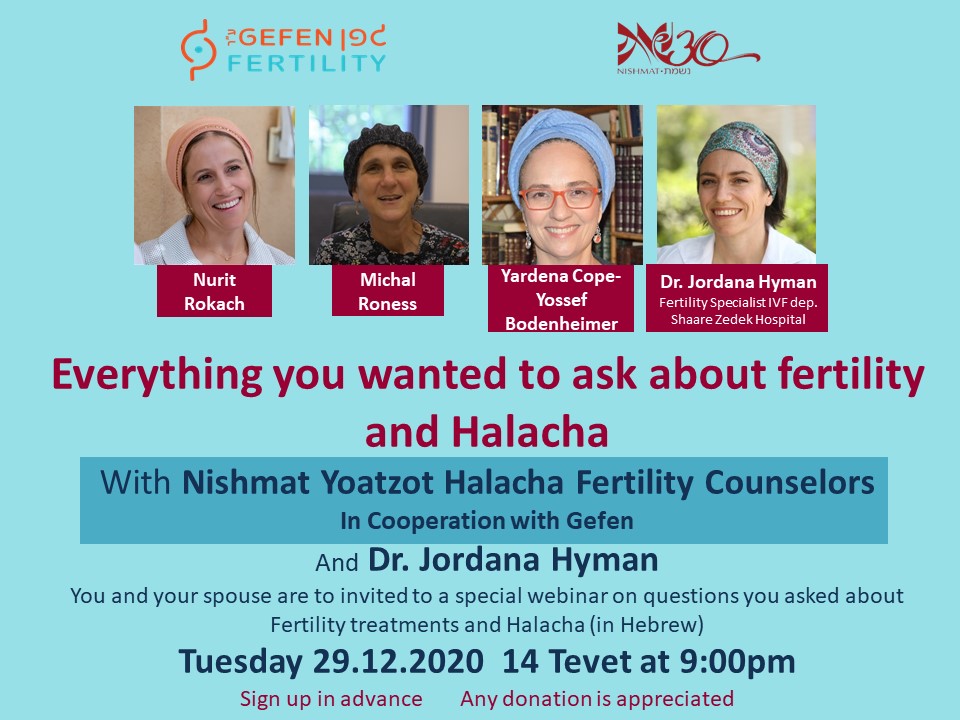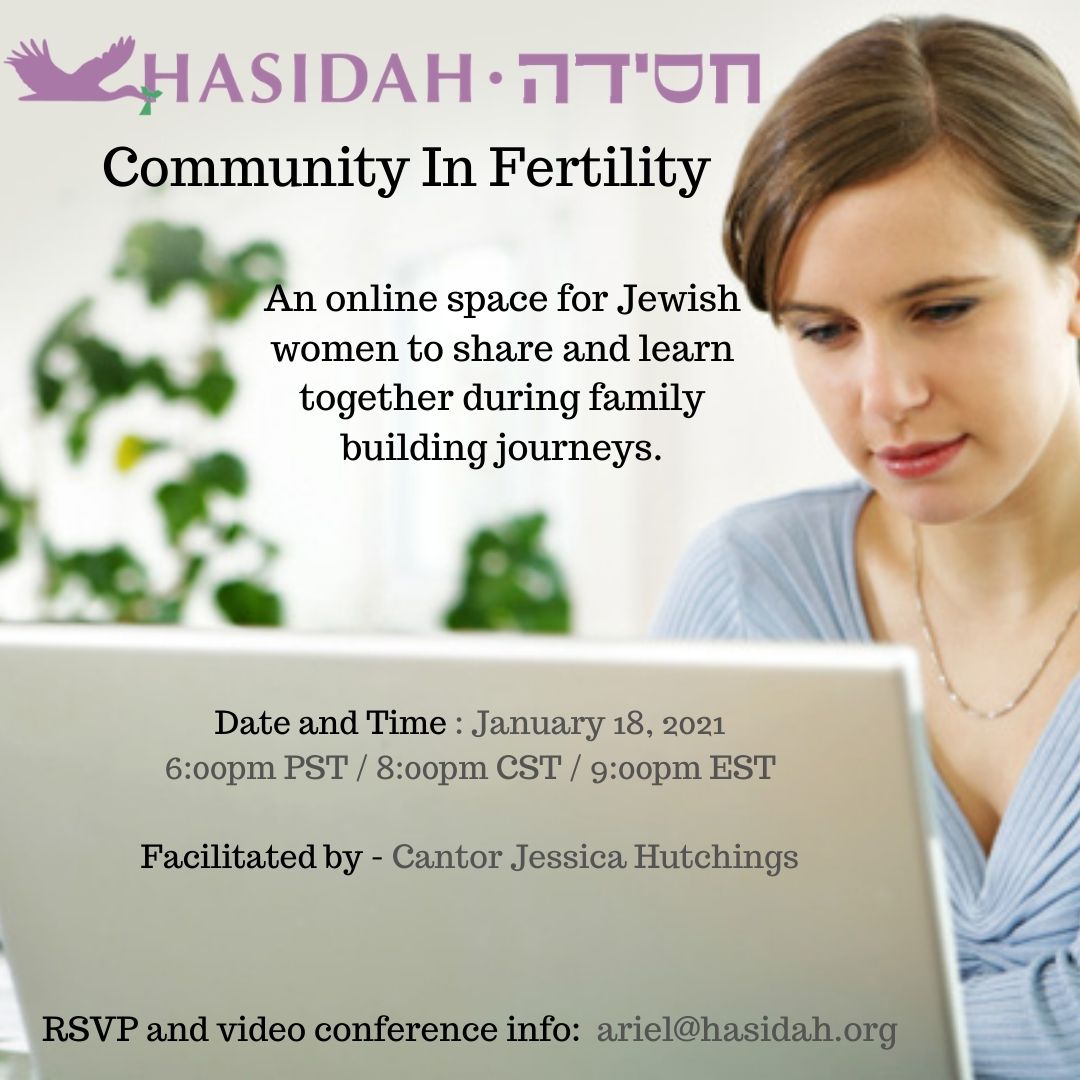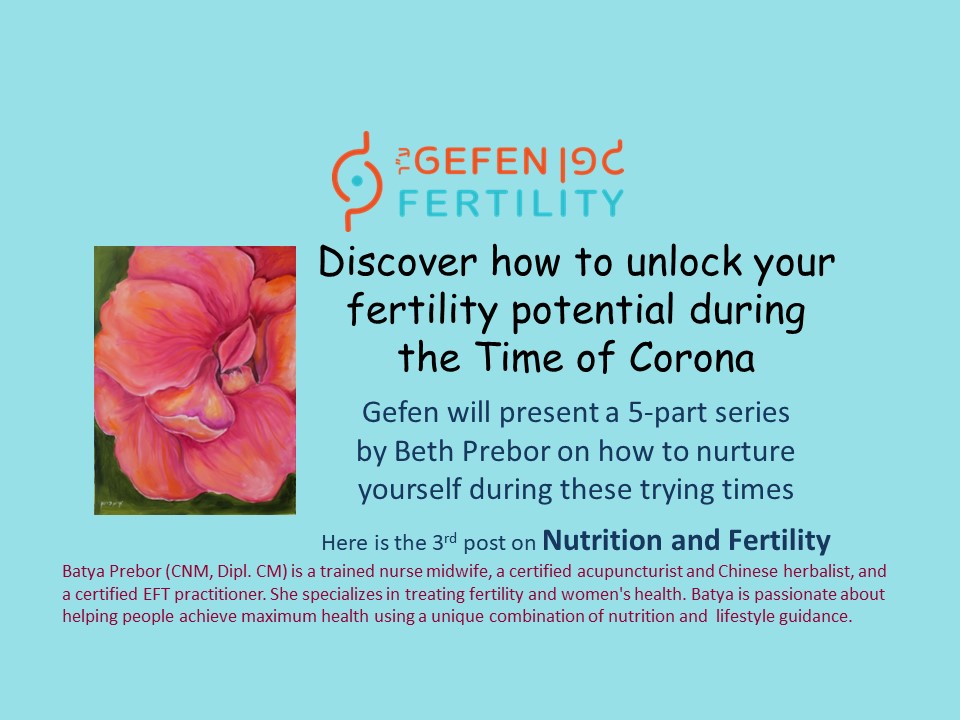- Details
- Written by: Shoshana Tita
We are proud to be included in the December issue of The Jerusalem Report


- Details
- Written by: Keren Gefen
In the time of social distancing Gefen-Rimon embraces you
We are gathering with the international community to share a schedule of online programs so we all may benefit from each other.

Gefen-Rimon Programs:
** Zoom Mind/Body CBT Fertility Workshop with Michal Lipschitz (in Hebrew). Sundays at 18:00-19:15
** Zoom Mind/Body Fertility Workshop for Men with Rav Yisrael Cohn (in Hebrew). Tuesdays at 20:30-21:30
** One-On-One Zoom EFT "Tapping" for Fertility with Pearl Lopian
Tapping is a highly effective method to reduce stress, tension and anxiety so that we have emotional freedom. It allows us to make peace with what is. For more information please WhatsApp Pearl: 058-7929110 or email her:
** Fertility Zoom Yoga Classes:
Fridays at 9:00
** Prenatal Zoom Yoga for women who have struggled with infertility:
Mondays at 18:30-19:15
** Postnatal Zoom Yoga for women who have struggled with infertility:
Thursdays at 20:00
** Creative Writing and Yoga with Jill Levenfeld
Thursdays at 11:00
** One-On-One Zoom Yoga
ZOOM YOGA: ID# 4823460447 Password: kady
For more information and registration please contact Kady:
Please see a Fertility Yoga Video created in the Time of Corona by Kady Harari, Gefen-Rimon Program and Yoga Director
** Healing and Aromatherapy Massage with Renee Miller
A relaxing session with essential oils to promote healing and a feeling of well-being and relaxation.
Gefen Partners:
Acupuncture for Fertility with Pnina Klinger
Please contact Pnina Klinger directly at 054-6566280 for a telephone conversation or an appointment. All treatments according to the strict guidelines of the ministry of health. See link to Pnina’s video about acupressure points you can use at home to enhance fertility and blood flow to the uterus.
Nishmat Fertility Counselors in cooperation with Gefen offer personal consultations to women and couples who seek halachic guidance throughout the fertility journey. Yoatzot Halacha Fertility Counselors have completed an advanced course of study in the halachic, medical and psychological aspects of fertility. We provide halachic guidance from diagnosis through treatment, including: common syndromes and diagnostic procedures, ovulation before immersion, sexual issues, fertility preservation, IUI, IVF, PGS, PGD, pregnancy loss and termination and third-party reproduction possibilities. To set up an internet meeting with a Yoetzet Halacha Fertility Counselor - contact on WhatsApp: +97226404330 or by email:

We are very proud of our informative and successful webinar. We look forward to invite you to a webinar in English which will be dedicated to the international community.
Coming Soon! Nishmat's Miriam Glaubach Center and Mizrachi Canada are hosting a Virtual Health & Halacha Conference - March 6-10, 2021. The conference will feature Nishmat's Fertility Counselors, trained in collaboration with Keren Gefen. Keren Gefen and Gefen NY will be participating in the conference. Join us!

I WAS SUPPOSED TO HAVE A BABY and SVIVAH
We invite you to sponsor the first-of-its-kind, Jewish Fertility Virtual Summit, being held on February 22, 2021. It is being organized by the two nonprofits - I Was Supposed To Have A Baby and SVIVAH.
This 90 minute event, including representatives from the 11 major Jewish fertility organizations in the United States, will be aimed at both the general public and leaders of our community, so that they can better understand and support those individuals and families dealing with infertility and/or pregnancy loss.

HASIDAH
Secondary Infertility Meet-Up - Second Wednesday of the Month
January 13th @ 5:30pm PST/ 7:30 CST/ 8:30 EST
Family building struggles can be painful and isolating at every stage. This virtual meet-up is for men and women who have a child/children and are experiencing infertility. It is an opportunity to talk, listen, and connect with others on a similar journey. The discussion of the meet-up is guided by the interests of those who attend.

Community in Fertility
January 18th @ 6pm PST/ 7pm MST/ 8pm CST/ 9pm EST
Facilitated by Cantor Jessica Hutchings
This meet-up is an online space for Jewish women to share and learn together during family building journeys. Each month has a specific topic to reflect on family building journeys in a Jewish context

Mikvah Tour
January 25th @ 5pm PST/ 6pm MST/ 7pm CST/ 9pm EST
Join us for a virtual mikvah tour led by Miriam Ferris from Berkeley Chabad, followed by an open discussion on using the Mikvah during times of infertility.

Infertility Meet-Up - First Monday of the Month
February 1st @ 6pm PST/ 7pm MST/ 8pm CST/ 9pm EST
This meet-up is open to men and women and is a chance to talk, listen, and connect with others on a similar journey. The discussion of the meet-up is guided by the interests of those who attend.

----------------------------------------------
A poignant article in The Layers Project Magazine by Tamar Ben Tzvi "The Waiting Game Called Infertility"
----------------------------------------------
AUTHOR AMY KLEIN
Kol Hakavod to Amy Klein who has come out with a new book: The Trying Game: Get Through Fertility Treatment and Get Pregnant Without Losing Your Mind
A great read.
----------------------------------------------
- Details
- Written by: Yedidia Stern and Karen Friedman
In the Book of Genesis, the boundaries of what will eventually become Jewish identity are clarified. Isaac and Jacob are in; Ishmael and Esau are out. Although all are members of the same family, they have different identities and different destinies. At the end of Genesis, the boundaries are closed: all of Jacob's descendants, the tribes and their genealogy, are part of one identity group, independent of their deeds. However, they are still just a family - seventy people.
In the Book of Exodus, the family’s unique identity is translated into the unique identity of a nation. This is the essence of Exodus—the formation of a nation. Of course, this is not merely a description of the past, but instructions for the present and future. This is the meaning of “The Deed of the Fathers is a Sign for the Sons” or in the words of philosopher Friedrich Schelling, “the mythology of the nation is its destiny.” And so, the reading of the weekly portion of the Torah - which in recent years has engaged not only the religiously observant, but also the secular Israeli - is likely to serve as a sign post for our present conduct and our planning of the Jewish future. The upcoming weekly columns, over the course of the Book of Exodus, will deal with this topic.
The family established the land of Canaan as the home port of its identity, deep and secure. However, at the end of the Book of Genesis, the family “descends” to Egypt, the place which represents a clear alternative to Jewish identity. Indeed, the central question is: Why does most of the biblical drama, beginning with this week's portion and continuing until the end of the Bible occur outside the land of Israel—in Egypt or in the desolation of the desert? Why do only very few of the Torah portions take place in the land of Canaan (and even in those few, there are recurring descents out of the country)? We will return to this question in later columns.
In any case, the first event in the family’s transition to nationhood is demographic growth. It is hard to conceive of a more detailed and impressive description of demographic growth than the opening verses of the Book of Exodus: “And the Israelites were fertile and prolific; they multiplied and increased very greatly, so that the land was filled with them.” If this had been the normal growth pace, Pharaoh would not have been concerned that “the Israelite people have become much too numerous and strong for us.” Indeed, a simple reading of the text teaches that the Israelites in Egypt were not enslaved for economic exploitation, as is commonly thought, but to prevent the growth of the group/population
What is customarily called the “natural rate of increase” was all but natural. In contradiction of plain logic and the pharaonic plan, slavery failed as a means of birth control. On the contrary. “The more they were oppressed, the more they increased and spread out.” The Midrashic description articulates this in characteristic manner: “The women would give birth to six at a time!” A simple calculation illustrates that ordinarily, in such a brief period, a group of seventy people could not multiply “naturally” so quickly as to constitute a demographic threat to an established, developed nation, the leader of the world at that time.
The first to herald our becoming a nation is none other than Pharaoh. He brands us, “the Israelite people” and calls the women “Hebrew women”. When a sociological phenomenon is given a name, it becomes a fact. Anti-Semitism arrives in the world together with recognition of the nation’s existence. Ancient Egypt was similar to both medieval and twentieth-century Europe: hatred of the other, for no reason (or more precisely — an imaginary reason), brings the leaders, then and now, to the extreme solution of enslavement and poverty, which is then replaced with an even more extreme solution: annihilation of the Jews. Pharaoh commands “all his people”: “Every boy that is born you shall throw into the Nile.” A few verses after the nation’s creation, all Jewish baby boys are exposed to the threat of death from everyone around them solely because of their Jewish identity. And what really happened? “And the people multiplied and increased greatly.”
The biblical choice of describing the initial shaping of Jewish identity with a demographic event seems obvious, since the existence of a large population is necessary (albeit insufficient) for the creation of a nation. However, it is not all that simple. Look at today’s European countries whose "natural rate of increase" is so low that their populations are dwindling. To maintain their economy, they must allow mass immigration from African and Muslim countries, which in turn, endangers the preservation of their identity for future generations. Perhaps, the demographic expression of the struggle for identity in our generation is the main story of the global era.
This is also a compelling contemporary Jewish story: the rate of natural increase in the state of Israel is the highest of all OECD countries by an astonishing amount (3.1 children per family and increasing in Israel versus 1.7 on the average and decreasing by other OECD members). In Israel, the demographic response to the Holocaust that annihilated one third of our people can be seen and heard in maternity wards with more beds than anywhere in the West. The predictors of gloomy demographic developments that would dwarf Israel’s Jewish majority have been proven false. This is not coincidence but rather, a noble expression of, “The Deed of the Mothers are a Sign for the Daughters.”
It is fascinating to discover that not only the “Hebrew women” guarantee our future, but that the state of Israel also participates in this effort in a major way. Couples challenged by infertility have the best chance in the world to have a non-spontaneous pregnancy. The funding of IVF ( In Vitro Fertilization ) in Israel from public monies is the most generous of anywhere and the relative number of IVF treatments per capita is the highest in the world. The state of Israel is the "Shifra and Puah" (the two midwives named in Exodus) of our generation.
Professor Yedidia Stern is President of The Jewish People Policy Institute and a professor of law at Bar-Ilan University. His wife, Dr. Karen Friedman, is the founder and director of Gefen Mind-Body Fertility Organization and the Hadassah-Rimon Center, non-profits that provide emotional and wellness support to fertility challenged women in Israel.
Translated by Felice Kahn Zisken
- Details
- Written by: Beth Prebor

Nutrition and Fertility
To be honest I have been a little daunted by writing this particular blog installment. Writing about nutrition and fertility is a monumental task. There is a lot of information out there, not all of it is clear or well researched, and some of it is controversial.
However, on the other hand, improving the quality of the fuel you put into your body is one of the easiest ways to improve fertility. What you eat forms the building blocks for optimal egg development and a healthy uterine lining - both of which are essential for conception and a healthy pregnancy.
Last week we discussed hydration. In this week’s blog about nutrition I’ve decided to focus on three specific food-related actions you can take right now to help improve your fertility. This is not a comprehensive nutritional plan but it certainly is a great place to start.
#1 Cut out down on sugar. Period.
I recognize that this is not a very popular recommendation but it is possibly the most important one. Maintaining stable blood sugar without spikes and dips might be the single most important fertility habit that you can implement.
Research is beginning to show that low intake of sugar is essential for both egg quality which affects the quality of the embryo, and for endometrial function which allows the fertilized egg to implant and for a pregnancy to develop.
The dangerous impact that elevated sugar has on fertility - specifically egg quality - has been shown in research done on Rhesus Monkeys. The researchers created two groups of monkeys. One group was fed low doses of sugar for 6 months, and the other received a regular monkey diet (without this additional sugar). Then both groups were put through a mock IVF cycle. Here’s what happened: 86% of the eggs that were retrieved from the monkeys who didn’t consume sugar matured and were of good quality. But only 18.5% of the eggs taken from the sugar eating monkeys were good quality. That’s a huge difference! And the sugar-eating-monkeys ate less sugar than many women consume.
The results from the Rhesus experiment might explain other research done on the connection between carbohydrate intake and blastocyst health in humans. In a recent study IVF patients with failed cycles who switched to a low-carbohydrate, high-protein diet and then underwent another cycle increased their blastocyst formation rate from 19% to 45% and their clinical pregnancy rate from 17% to 83%.
In fact, as a result of the study, one of the authors of the study now requires his IVF patients to maintain a diet of 25 percent or more protein and less than 40 percent carbohydrates for three months prior to beginning in vitro fertilization treatment.
So cutting sugar is important for fertility, but how do you do it?
I recommend starting with cutting out processed sugar. Just stay away from processed foods with added sugar in them (for example cakes, cookies, muffins, granola bars) and instead turn to fresh whole fruits, nuts, seeds and vegetables.
Which brings us to the next rule...
#2 Aim to eat at least Five Vegetables a day
We are constantly being told to eat vegetables - so I’m sure this comes as no surprise. In fact the American Cancer Society advises eating at least five servings of fruit and vegetables per day for good health while the Harvard School of Public Health goes even further recommending nine servings of fruit and vegetables each day.
Why are vegetables so important?
Vegetables are high in nutrient content - they pack a lot of power in their punch. They are loaded with vitamins (like A and C) and minerals (like potassium and magnesium) that contribute to cellular growth and the maintenance of good health.
Vegetables also contain substances called antioxidants. Antioxidants are extremely important in helping our bodies fight the cellular damage that occurs on a day to day basis. Antioxidants can help prevent diseases like heart disease, stroke, and diabetes.
But antioxidants are also connected to fertility (surprise, surprise!) The oxidative stress that antioxidants fix is associated with conditions like endometriosis, PCOS, and unexplained infertility. It is believed that antioxidants can benefit fertility through mechanisms such as improved blood circulation in the uterine lining, decreased insulin resistance, and improved mid-cycle fertile cervical mucus. So ingesting foods that are high in antioxidants could boost fertility.
Be sure to choose richly colored vegetables. The different colors are really flavonoids which are naturally occurring pigments that give the vegetables their enticing color and that have antioxidant or cell-protecting qualities. Yellow and orange vegetables such as carrots, sweet potatoes, and pumpkin are rich in carotenoids that supply your body with vitamin A. Red fruits and veggies like tomatoes have lycopene. Blue and purple vegetables and fruit are high in phenolic flavonoids which are potent antioxidants so be sure to include red cabbage, purple onions, blueberries and the like. And green vegetables have the added benefit of including nutrients such as calcium, iron, and folate. Folate is extremely important as it supports healthy cell division (important for egg quality) and it promotes proper fetal growth and development to reduce the risk of birth defects such as spina bifida.
Vegetables are also high in fiber. Fiber helps create the feeling of being full - which helps when we are trying to cut down on sugar. Fiber is also important for maintaining bowel regularity and health which allows for body detoxification. Ensuring that our bodies get rid of waste is actually an important way to support balanced hormones by allowing our bodies to get rid of the metabolic waste after it breaks down the hormones.
In 2007 Harvard researchers evaluated data from the famous Nurse’s Health Study which collected data over a number of years from over 18,000 women. In this 2007 study researchers examined the relationship between carbohydrate intake and fertility and they published their results in a book called “The Fertility Diet”. They concluded that a diet high in fiber (and low in trans fats) provides the best nutrition to optimize fertility. So eat lots of vegetables!
Lately the Mediterranean diet is getting a lot of publicity for its ability to enhance fertility. The Mediterranean diet is based on the traditional foods that people used to eat in countries like Greece and Italy around 1960. This diet focuses on eating lots of vegetables, fruits, nuts, legumes, whole grains, seafood, and extra virgin olive oil.
A recent study examined if adherence to the Mediterranean diet (MedDiet) is associated with better IVF performance. They discovered that in women under age 35 a Mediterranean diet made a huge difference. Women who had the highest score on the Mediterranean diet score were around twice as likely to conceive and give birth than women with low scores. The study concluded that eating a Mediterranean diet may help increase the chances of a successful pregnancy and delivering a live baby for women undergoing IVF treatment.
# 3 Eat (organic) Eggs
There is a traditional Chinese saying: “Eat as many eggs as you can afford for a smart baby.”
It seems like they were right. After many years of eggs getting a bad rap they are once again reclaiming their well-deserved respect. In reality eggs are like a superfood.
They are packed with macronutrients like protein and fat and micronutrients (vitamins and minerals) like B2,5,12, Vitamin A and selenium. Eggs actually contain small amounts of almost every vitamin and mineral required by the human body including folate which we know is important when preparing for pregnancy. They also contain the amino acid choline which improves follicle quality and like folate helps prevent neural tube defects and aids in brain development.
We know that eggs have cholesterol. But that’s good. Our bodies need cholesterol to manufacture sex hormones which is important for fertility. Cholesterol is also important for healthy brain development. To that end your body produces cholesterol every single day! But eggs can actually improve your cholesterol profile since studies show that the cholesterol in eggs raises the “good” HDL cholesterol in the body and transforms the “bad” LDL cholesterol into a less dense version which is relatively harmless.
While all eggs are egg-ceptional I recommend organic free-range eggs. These eggs are laid by chickens who are usually cage free, are allowed to feed from the land, and don’t receive hormones or antibiotics. In addition to supporting an industry with good values, you will get more nutrients since organic eggs are actually more nutritious than conventional ones. While all eggs contain similar amounts of protein, research shows that organic eggs have more vitamins and minerals. For example one study found that organic eggs have three times more omega-3 fatty acids, 40% more vitamin A and twice as much vitamin E.
So start your day with eggs - remember - most of the nutrients are in the yolks so make sure to eat them too!
So here’s the plan:
1) Cut out sugar
2) Eat at least five vegetables per day - preferably different colors
3) Eat (organic) eggs


